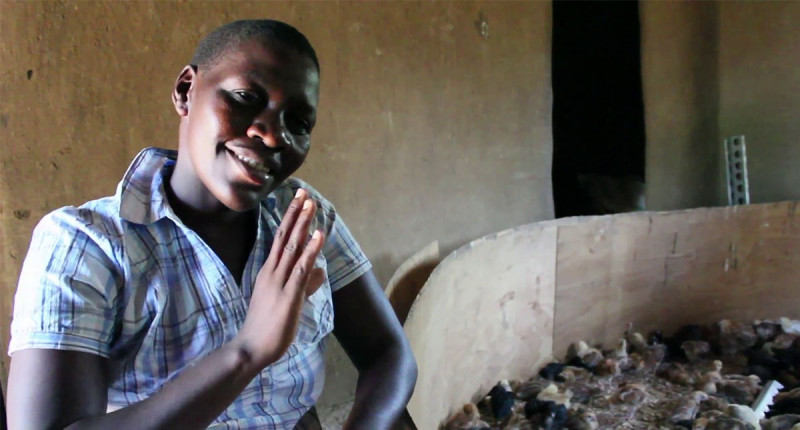Sawa Pius | January 9, 2017
Triza Atieno had been trying to keep poultry, but was unsuccessful. She didn’t vaccinate her birds. As a result, the chickens were always sick and died in large numbers. She says, “I bought 300 birds and they were all wiped out by a disease that broke out in the area. I lost hope and almost gave up.”
Mrs. Atieno is an established poultry farmer from Kamser village, in western Kenya’s Homa Bay County. She is now vaccinating chickens so that her brood—and her neighbours’ broods—have the best chance of surviving.
Mrs. Atieno and other farmers in her area formed the Young Sister Muungano Group in 2014 so that they could be trained on raising poultry.
Fortunately, an NGO in the area trained 20 members of the group the same year—and Mrs. Atieno was one of them.
After the training, Mrs. Atieno became a village vaccinator. With no-one else to vaccinate chickens in her area, she was a useful resource for other farmers. She traveled from farm to farm vaccinating chickens aged from one-day- to three-months-old. She built a business brooding chicks and vaccinating chickens in her neighborhood. And this time, all of her chicks grew to maturity.
Alice Onyach Achieng also raises chickens in Homa Bay County. She started with 20 birds, which Mrs. Atieno helped her to purchase. Now she has 200 chickens.
Mrs. Achieng says she sells both eggs and mature birds to residents of Homa town. She says, “I encourage farmers who have not embraced poultry keeping to start doing so because it is high-paying. I sell a mature cock at not less than 700 Kenya shillings [$7 US].”
Mrs. Atieno vaccinated the chickens of her neighbour, Irine Anyango Ogindo, against Newcastle disease, fowl pox, and Gumboro disease.
Mrs. Ogindo is happy with Mrs. Atieno’s help. Her 150 chicks have grown to maturity without any deaths. She explains, “I am targeting to reach 900 chickens so that I can make good money and pay school fees for my children in college.”
Mrs. Atieno is not the only support for local chicken farmers. Farmers in the area have formed a community bank called The Great Wang’Chieng Financial Services. The bank has more than 2,000 members who are shareholders—the majority of them poultry farmers.
The community bank provides loans so members can purchase chicks, poultry feed, and vaccines, among other things. Loans are repaid with interest. Mrs. Atieno says that, since every member is a shareholder, members save their income in the bank and receive dividends at the end of the year.
Caroline Owinyo is the manager at the bank. She says the banking services serve the entire community, including fishermen and motorcycle drivers. She adds: “We encourage every member in the area to save with us, because the nearest bank here is more than 100 kilometres away, and most farmers cannot afford to travel just to go and deposit their money there.”
Mrs. Owinyo is also an expert on poultry farming. She says poultry are an important source of income for small-scale farmers in semi-arid areas like Homa Bay because not everyone can depend on fishing and crop production.
Mrs. Atieno makes around 40,000 Kenya shillings ($400 US) per month from brooding and vaccinating. She says: “This poultry business started as a joke. I didn’t expect much, but when I vaccinated the chicks and after three months I sold one cock at 700 Kenya shillings ($7 US), I was very happy. I do not [need to] look for the market because it is already there, as clients just call me placing orders.”
